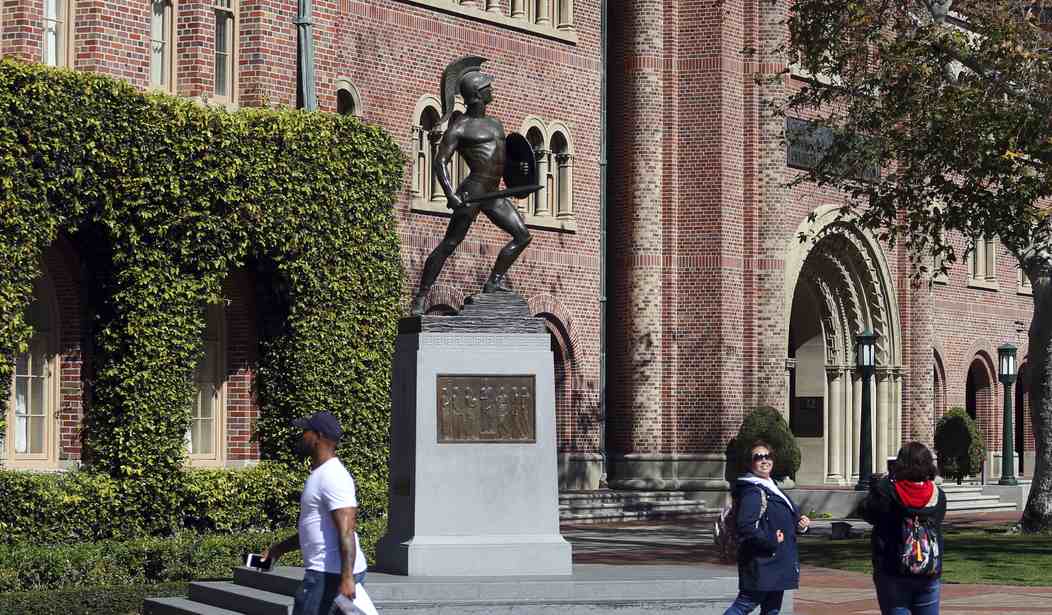Is there any area of society that politics has not infested? A new study shows that college students are increasingly taking politics into consideration when choosing the schools they wish to attend.
Yes, campus life has always involved politics. As young Americans begin learning about various ideologies, political expression has become a prominent part of the college experience. However, if the findings of this survey are any indication, politics might just be having even more of an impact on academia.
The Art & Science Group published the findings of a new study showing that those considering where they wish to go to college are basing these decisions largely on the politics of the state in which their prospects are located. The authors wrote:
In our national survey this winter, a substantial fraction of high school seniors bound for four-year colleges as fulltime students reported passing over a school they had initially considered, based exclusively on state-level political considerations. This was true across the spectrum of political ideologies (among students who identified with some level of liberal, moderate, or conservative-leaning), and across some other interesting dimensions.
Several prestigious universities across the United States, such as Tulane University in Louisiana, Stanford in California, Rice in Texas, Columbia in New York, and the University of Miami, have long boasted of their diverse student body, consisting of candidates from every state in the country. Meanwhile, the University of Alabama, a public institution, has come to rely heavily on non-resident admissions to generate revenue, with nearly 60 percent of its student population hailing from out-of-state.
However, a troubling trend has emerged where a significant number of conservative and liberal applicants are rejecting these universities and their respective states altogether due to political partisanship, according to The Hill.
“When you’re making a decision about a school, it’s really about choosing a community to live in,” Chloe Chaffin, 20, a junior at Washburn University in Kansas told The Hill. “Students want to feel that they belong to the city-community beyond the campus walls.”
Chaffin is a liberal and an abortion-rights activist. She chose not to leave her home state because of the defeat of a ballot measure that would have further restricted abortion.
The survey revealed that 31 percent of liberal respondents rejected colleges over abortion rights and other issues. Their most commonly-rejected states were Alabama, Texas, Louisiana, and Florida, all states that passed abortion restrictions after the Supreme Court overturned Roe v. Wade.
Gregory Koger, a political scientist at the University of Miami, told The Hill, “If you’re female, there’s some chance that you might need access to an abortion, and there are some states where that’s not possible. If you’re LGBTQ, you want to go to schools and to states that are friendly toward that.”
About 28 percent of conservative respondents also based their decisions on politics. They rejected states like California and New York. They cited concerns over censorship and ostracization because of their political beliefs. Over the years, numerous college applicants have opted to steer clear of certain educational institutions or even entire regions based on political leanings. Conservatives, in particular, have expressed discontent with what they perceive as a stifling of divergent opinions on liberal-leaning campuses.
This revelation seems to affirm what people have already realized: Political division is affecting college enrollment. It is yet another indicator that America is headed towards a national divorce, of sorts. It may not resemble the predictions of such a shift, which involve splitting into two nations officially. But if students are looking to attend colleges that will affirm – or at least not suppress – their chosen political views, then this could create academic institutions that are segregated by political affiliation.
From what I have been seeing over the past few years, this is where the nation seems to be going. People are moving from blue states to red states in swarms over the past decade. It would not be a surprise to see some moving to blue states due to politics – especially over the abortion issue.
But, if our institutions and industries are becoming more siloed, it will probably deepen the division we are seeing today. This might not sound like a desirable outcome – but it might be the best we can expect at the moment.














